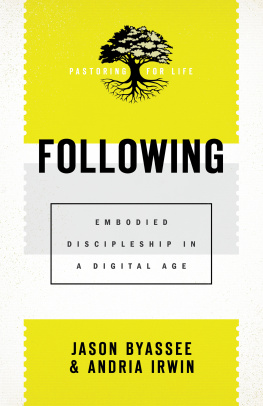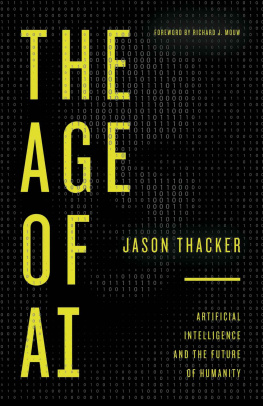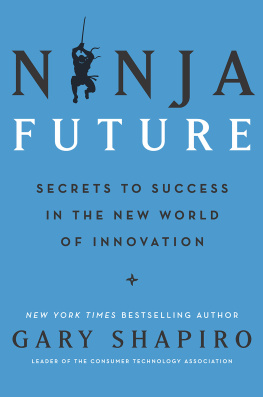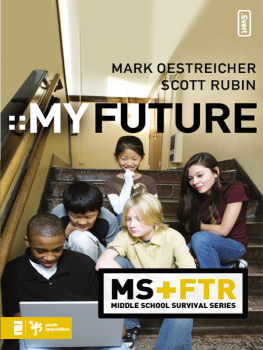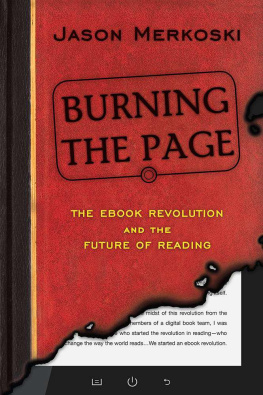Jason Strong - Future You: Essential Future Technologies You Need To Know To Survive The Digital Era
Here you can read online Jason Strong - Future You: Essential Future Technologies You Need To Know To Survive The Digital Era full text of the book (entire story) in english for free. Download pdf and epub, get meaning, cover and reviews about this ebook. year: 2018, publisher: Independently published, genre: Computer. Description of the work, (preface) as well as reviews are available. Best literature library LitArk.com created for fans of good reading and offers a wide selection of genres:
Romance novel
Science fiction
Adventure
Detective
Science
History
Home and family
Prose
Art
Politics
Computer
Non-fiction
Religion
Business
Children
Humor
Choose a favorite category and find really read worthwhile books. Enjoy immersion in the world of imagination, feel the emotions of the characters or learn something new for yourself, make an fascinating discovery.

- Book:Future You: Essential Future Technologies You Need To Know To Survive The Digital Era
- Author:
- Publisher:Independently published
- Genre:
- Year:2018
- Rating:3 / 5
- Favourites:Add to favourites
- Your mark:
- 60
- 1
- 2
- 3
- 4
- 5
Future You: Essential Future Technologies You Need To Know To Survive The Digital Era: summary, description and annotation
We offer to read an annotation, description, summary or preface (depends on what the author of the book "Future You: Essential Future Technologies You Need To Know To Survive The Digital Era" wrote himself). If you haven't found the necessary information about the book — write in the comments, we will try to find it.
Jason Strong: author's other books
Who wrote Future You: Essential Future Technologies You Need To Know To Survive The Digital Era? Find out the surname, the name of the author of the book and a list of all author's works by series.
Future You: Essential Future Technologies You Need To Know To Survive The Digital Era — read online for free the complete book (whole text) full work
Below is the text of the book, divided by pages. System saving the place of the last page read, allows you to conveniently read the book "Future You: Essential Future Technologies You Need To Know To Survive The Digital Era" online for free, without having to search again every time where you left off. Put a bookmark, and you can go to the page where you finished reading at any time.
Font size:
Interval:
Bookmark:
Future You
Essential Future Technologies You Need to Know to Survive the Digital Era
By Jason Strong
Copyright
2018 Jason Strong
All rights reserved. No portion of this book may be reproduced in any form without permission from the publisher, except as permitted by U.S. copyright law. For permissions contact:
Cover by Panagiotis Lampridis
ISBN: 9781729387948
Table of Contents
Introduction
Artificial Intelligence
Data and the Internet
Transportation
Energy
Genomics and Gene Modification
Bionics
Employment
Conclusion
It is hard to believe the World Wide Web has been in existence since just 1990. In the same 28 years it takes the average person to finally purchase their first house, the World Wide Web has morphed into a ubiquitous presence on which the whole of modern civilisation has become entirely dependant upon. With the rate of change in technology growing exponentially, it becomes both difficult and intimidating to imagine life in a further 28 years. Will fossil fuels and the resulting environmental damage destroy our world beyond repair? Will artificial intelligence become so advanced that it displaces humans as the dominant life form on earth? Who will be the winners and losers in an era of constant and rapid technological evolution? More importantly, where do you, as a blue collar, white collar, business owner or student, stand in a world where technology is transforming whole industries by the month. For some there will be boundless opportunities, for others there is only hardship and misery. The only certainty is the very reasoning for writing this book; those who are willing to learn, adapt and evolve will open themselves to immeasurable opportunity. Those who do not will find themselves quickly displaced by increasingly more capable technology.
The modern world is now entering a fourth industrial revolution. The previous three (steam, mass production, and the digital revolution) saw employment rise in line with productivity, benefiting both businesses and consumers. Higher productivity creates higher paying jobs, in turn creating more disposable income. More disposable income allows consumers to purchase more, which further increases demand and the cycle of prosperity continues. This pattern has been the catalyst for the rapid economic growth seen in developed countries for the last century or so. This fourth revolution, one where the lines between the real and digital worlds are blurring, is worryingly different, however. Employment and productivity are now diverging. Despite employment reaching a record high in much of the developed world, productivity (global output) is flat lining. The importance of this finding can not be overstated; productivity, and hence the prosperity of society, is becoming less dependent on human input. Businesses are now turning to robotics and artificial intelligence, which can be much more efficient, to fill this productivity gap. The robot revolution is spreading beyond blue collar jobs such as supermarket cashiers and restaurant waiters into white collar territory, such as lawyers, financial analysts, and even doctors. No one can assume they are safe. Are you going to simply stand by and let luck determine your fate? Or are you going to exploit and leverage the upcoming technologies and trends outlined in this book to take control of your own destiny?
Having had an extensive career in the automotive and construction industries, I have seen first-hand both the innovation and damage automation can reap. GPS led construction plant like excavators and dumpers, are now more accurate and more efficient than even the best human operators. Automated robotics can build cars quicker, cheaper and to a better quality than a human ever could. It is first-hand knowledge and experience that I bring to you, with the hope that you will embrace not only the entailed knowledge but also the corresponding advice and insights to ensure you do not get lost in the world of rapid change, but instead use it to leverage results and get ahead of your competition.
This book will give a comprehensive overview of some of the most disruptive technologies and industries in the near future, with particular focus on artificial intelligence and automation and the effects they will have on business and employment. We won't get stuck into nitty-gritty details, that is the job of other, more specialized, books. Instead, you will build a strong foundation of knowledge of how some of the most disruptive industries will change how we live and work along with the many opportunities it will create. You will learn of trends and patterns these technologies create and come to some enlightening conclusions. Ill let you into one of the biggest: you will never win a fight against technology. As technology becomes increasingly faster, cheaper and more capable, those who resist and fight will only prolong the inevitable pain and misery while those who accept it and use it to their advantage will enjoy a rewarding and prosperous life.
This book is inspired by the mantra of one of the most revered businessman of the past century, Warren Buffett. Seen as one of the most successful investors ever, he maintains that the best investment you can make is in yourself. The best place to start is by learning as much as you can, such as with this book. You are also never too old to learn or retrain; as we will see, those who are taking online degrees are on average in their mid-30s, have at least one child and are in full employment. There is no excuse. There is also no excuse to delay. As AI in the workplace gets exponentially more common, those who are the least prepared will be the first to go. Can you afford to be that person? I know I cant, so without further ado, lets address the elephant in the room and our first topic - artificial intelligence.
Brain Box
Artificial intelligence (AI) has been the buzzword in the tech world for the past few years now, with seemingly small, unproven and unprofitable businesses being snapped up for extortionate sums by the key players in the technology sector. An acute lack of AI talent in a field vital to future economic growth has created a whirlwind of acquisitions. Leading the charge, unsurprisingly, is Google, followed by the likes of Apple, Microsoft, Amazon, and Intel. Between 2013 to 2017, there was a fivefold increase in the number of AI acquisitions from 22 to 115. Other industries whose business does not rely on such technology are also jumping on the bandwagon, with Ford investing $1 billion in Argo AI in 2017. If I could go back a few years and realign my career path, a software developer in the AI field would be a very comfortable place to be right now.
Despite being an intangible force, AI is already deeply embedded into society, perhaps irreversibly so. Even the dreaded morning commute relies on AI to make our trip safer, from anti-lock brakes in modern vehicles to smart all-wheel drive (AWD) systems ensuring wheels point firmly in the same direction as that intended. Without them, many lives would be lost each year.
Capabilities generally covered under the category of artificial intelligence include a successful understanding of human speech (think Siri and Alexa), competing in high-level strategic games (Chess and Go), military simulations, autonomous cars and interpreting complex content such as face recognition, now available on most smartphones.
These are all examples of a narrow or weak AI; artificial intelligence which has a specific intended purpose and can only do that one programmed primary task (despite doing it very well). They are weak by name but not by nature; they form very powerful and useful tools when used for the right purposes and have proved to be hugely valuable for those who utilise them. Current technology limits developers to mostly weak forms of AI but many companies are now setting their sights on general intelligence AI. Thanks to advances in computer power, processing, and storage, developers are now able to build upon weak AI, creating what is termed strong AI systems which would be able to draw upon its own pools of resources to solve problems long thought to be only possible by human intelligence. They would also be highly versatile and, as opposed to weak AI whose programming needs to be tailored for each and every situation, it would be able to complete a wide variety of tasks without human interference or reprogramming. It could be comparable to human intelligence insofar as its ability to identify unfamiliar problems, predict outcomes and devise unique solutions. General intelligence is where AI starts to raise concerns for some; a machine with the ability to think for itself and obtain self-awareness exposes humanity to many uncomfortable positions.
Font size:
Interval:
Bookmark:
Similar books «Future You: Essential Future Technologies You Need To Know To Survive The Digital Era»
Look at similar books to Future You: Essential Future Technologies You Need To Know To Survive The Digital Era. We have selected literature similar in name and meaning in the hope of providing readers with more options to find new, interesting, not yet read works.
Discussion, reviews of the book Future You: Essential Future Technologies You Need To Know To Survive The Digital Era and just readers' own opinions. Leave your comments, write what you think about the work, its meaning or the main characters. Specify what exactly you liked and what you didn't like, and why you think so.

